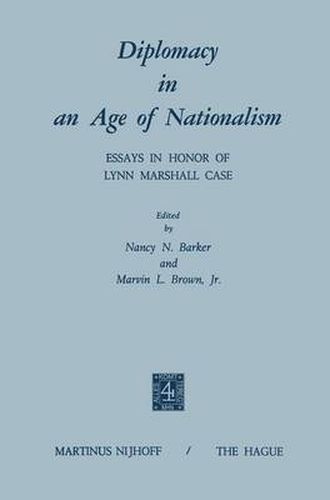Readings Newsletter
Become a Readings Member to make your shopping experience even easier.
Sign in or sign up for free!
You’re not far away from qualifying for FREE standard shipping within Australia
You’ve qualified for FREE standard shipping within Australia
The cart is loading…






In the late nineteenth and early twentieth century international rela tions took on new and frightening aspects. A resurgent nationalism sharpened the conflicts between states, while an increasing industrial ism afforded them the means to make war on a scale previously unimaginable. Never before had there been greater need for art and skill in the conduct of international negotiations. The statesmen in charge of this intercourse often fell far short of the ideal necessary to eliminate the tensions in international relations. They not only had to deal with problems of great complexity, but they varied greatly in their temperaments, in their abilities, and even in their inclinations to accommodate themselves to a solution. Nevertheless, traditional diplomacy made possible the orderly handling of international crises and kept open the lines of communication. With all its imperfections it contributed largely to the maintenance of the European order from the turbulent mid-century through La Belle Epoque. The colleagues and former students of Professor Case represented here share with him his interest in this aspect of history. They analyse the methods of diplomats and the policies they implemented in articles ranging from empires in Africa and Mexico to Turkey and the Eastern Question. But regardless of the diversity of the subjects treated they are never separated from the mainstream of the diplomatic policies of the great powers. Moreover, the articles represent the same approach to history and the same techniques employed by Professor Case.
$9.00 standard shipping within Australia
FREE standard shipping within Australia for orders over $100.00
Express & International shipping calculated at checkout
In the late nineteenth and early twentieth century international rela tions took on new and frightening aspects. A resurgent nationalism sharpened the conflicts between states, while an increasing industrial ism afforded them the means to make war on a scale previously unimaginable. Never before had there been greater need for art and skill in the conduct of international negotiations. The statesmen in charge of this intercourse often fell far short of the ideal necessary to eliminate the tensions in international relations. They not only had to deal with problems of great complexity, but they varied greatly in their temperaments, in their abilities, and even in their inclinations to accommodate themselves to a solution. Nevertheless, traditional diplomacy made possible the orderly handling of international crises and kept open the lines of communication. With all its imperfections it contributed largely to the maintenance of the European order from the turbulent mid-century through La Belle Epoque. The colleagues and former students of Professor Case represented here share with him his interest in this aspect of history. They analyse the methods of diplomats and the policies they implemented in articles ranging from empires in Africa and Mexico to Turkey and the Eastern Question. But regardless of the diversity of the subjects treated they are never separated from the mainstream of the diplomatic policies of the great powers. Moreover, the articles represent the same approach to history and the same techniques employed by Professor Case.